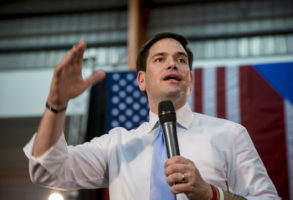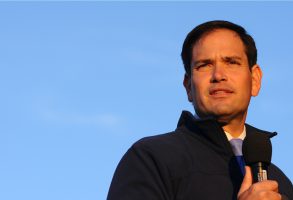Published September 29, 2015
Wisconsin Gov. Scott Walker dropped out of the race for the GOP nomination for president last week, joining former Texas Gov. Rick Perry as the early casualties of the 2016 cycle. Their departures leave 15 remaining Republican candidates for president, so the process of “thinning the ranks” is really just getting started and will continue for several months.
For now, the primary story line of the Republican campaign has been the rise of the outsider candidates and the struggles of the more traditional candidates to gain traction. In the aftermath of the second GOP primary debate, polls are showing a surge for Carly Fiorina, who has never held elective office and whose views on policy matters are largely unknown. She is now in third place in the RealClearPolitics polling average, with the support of about 11.6 percent of voters likely to participate in the GOP caucuses and primaries. Donald Trump remains in first, with an average level of support of 23.4 percent, and Ben Carson is second at 17 percent.
Although Texas Sen. Ted Cruz is a current officeholder, and therefore not truly an “outsider,” his campaign is predicated heavily on his contention that much of the problem in Washington is due to feeble GOP leadership in Congress. So his campaign has the look and feel of a non-traditional, outsider candidate too. Cruz is now in sixth place in the RCP average.
In contrast to these candidates, former Florida Gov. Jeb Bush has seen his support slide modestly in recent weeks. He now sits in fifth place, just behind Marco Rubio and slightly ahead of Cruz. He is also running sixth in Iowa and fifth in New Hampshire in the latest polls taken in those important early-voting states. Other more traditional candidates, including sitting GOP governors John Kasich and Chris Christie, are trailing the non-traditional campaigns as well.
The less-than-imposing campaigns of Bush and the other traditional candidates have some political observers feeling rather bearish on their eventual prospects. But that’s an overreaction to current, and temporary, trends. The coming months are likely to be much friendlier toward Bush, Rubio, and perhaps a couple of other more traditional candidacies as well.
That’s due in large part to the inevitable decline of the outsider campaigns. Whatever one may think of the current “top three,” it is implausible that any of one of them will emerge as the GOP nominee. The two major political parties have no history of nominating candidates with profiles like those of Trump, Carson, or Fiorina.
While this may be an unusual political moment, it’s not that unusual. Eventually, press scrutiny, lack of traditional donor support, lack of enthusiasm from the party apparatus, thin organizations, negative advertising from rival campaigns, and a more attentive and discerning electorate will take a good deal of the air out their balloons. The candidates with stronger records of political success will then see their positions improve.
Another important factor is the coming change in prominent campaign topics. For the past few months, the media have steered the conversation toward topics the media likes conservatives to discuss rather than to the ones that actually concern the most voters. So, at the recent CNN debate in California, much of the time was spent on birthright citizenship, border control, marijuana legalization, and responses to the personal attacks from rival candidates.
There was almost no discussion of economic growth and job creation. As actual voting nears, the fringe issues will fade as the electorate insists on hearing more from the candidates on what they would do to help middle-class families do better in the future than they have in the recent past. That will inevitably push the political conversation toward issues like tax reform, spending restraint, reform of government, regulatory changes, paying for higher education, and the replacement of Obamacare. This is a playing field that will favor the more traditional candidates who are running largely because they believe they have a positive track record, and solid ideas, on these bread-and-butter issues.
A few of the campaigns are readying themselves for this new, more serious phase of the race. Both Bush and Rubio are particularly well positioned for this debate. Bush recently released a very strong tax reform plan, as did Rubio earlier this year. Rubio has proposed major reforms for entitlement programs,a replacement plan for Obamacare, and a welfare reform framework. Bush has proposed plans forshrinking government, and cutting regulations, and he has signaled plans are forthcoming across a range of important issues, including energy and health care.
Christie spent the spring developing his own policy proposals covering taxes, energy, and rebuilding the military. His plan for entitlement reform is arguably the boldest of any of the GOP campaigns. Kasich has yet to get very specific on policy, but his impressive record of reform in Ohio, and his experience in Congress, would make him a credible messenger for a pro-growth reform agenda if he chooses to advance one.
Cruz could also see his prospects improve in the coming months as support for the political novices inevitably wanes. But he will have to offer more specific policy proposals than he has to date to take full advantage of this opportunity. Cruz likes to invoke former President Ronald Reagan on the campaign trail, but Reagan had a long track record and a plan for governing when he ran for president in 1980. So far, Cruz has given no sense of what he would actually do if elected beyond reversing, as much as possible, whatever President Obama put in place during his time in office. That won’t be enough to go the distance.
Getting serious about policy does not guarantee political success, of course. Voters are not particularly impressed by long white papers. But neither are they impressed by flimsy, half-baked ideas that don’t stand up to sustained scrutiny. It is the traditional candidates who are far more likely to have the expertise and experience to lay out plans for reform that look practical and can withstand the inevitable critiques that will come from Democrats and the media. This is an important way for voters to see who might actually be electable, and therefore have a chance to implement a positive, pro-growth reform plan.
This campaign cycle is unusual because of the large number of GOP candidates competing for the nomination. There really is no precedent for predicting exactly how this will play out in the coming months. And American politics does in fact produce some surprises, so it is possible that in 2016 the GOP will nominate a very non-traditional standard-bearer. But it is not likely.
GOP voters want to pick a candidate who has a chance to win. That is a subjective standard, for sure. But it is the kind of standard around which a consensus usually does form. Right now, those responding to polls aren’t screening out those candidates who would have no chance of ever winning the 2016 presidential election. But that time will come, at which point the polls will start shifting toward the candidates one might have expected six months ago to be the leading contenders.









